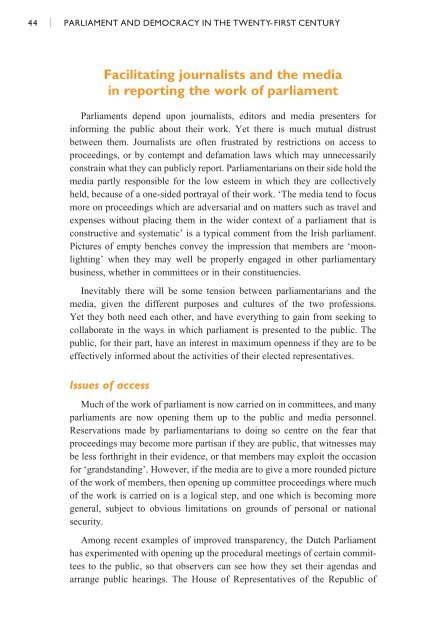PARLIAMENT AND DEMOCRACY - Inter-Parliamentary Union
PARLIAMENT AND DEMOCRACY - Inter-Parliamentary Union
PARLIAMENT AND DEMOCRACY - Inter-Parliamentary Union
Create successful ePaper yourself
Turn your PDF publications into a flip-book with our unique Google optimized e-Paper software.
44 I <strong>PARLIAMENT</strong> <strong>AND</strong> <strong>DEMOCRACY</strong> IN THE TWENTY-FIRST CENTURY<br />
Facilitating journalists and the media<br />
in reporting the work of parliament<br />
Parliaments depend upon journalists, editors and media presenters for<br />
informing the public about their work. Yet there is much mutual distrust<br />
between them. Journalists are often frustrated by restrictions on access to<br />
proceedings, or by contempt and defamation laws which may unnecessarily<br />
constrain what they can publicly report. Parliamentarians on their side hold the<br />
media partly responsible for the low esteem in which they are collectively<br />
held, because of a one-sided portrayal of their work. ‘The media tend to focus<br />
more on proceedings which are adversarial and on matters such as travel and<br />
expenses without placing them in the wider context of a parliament that is<br />
constructive and systematic’ is a typical comment from the Irish parliament.<br />
Pictures of empty benches convey the impression that members are ‘moonlighting’<br />
when they may well be properly engaged in other parliamentary<br />
business, whether in committees or in their constituencies.<br />
Inevitably there will be some tension between parliamentarians and the<br />
media, given the different purposes and cultures of the two professions.<br />
Yet they both need each other, and have everything to gain from seeking to<br />
collaborate in the ways in which parliament is presented to the public. The<br />
public, for their part, have an interest in maximum openness if they are to be<br />
effectively informed about the activities of their elected representatives.<br />
Issues of access<br />
Much of the work of parliament is now carried on in committees, and many<br />
parliaments are now opening them up to the public and media personnel.<br />
Reservations made by parliamentarians to doing so centre on the fear that<br />
proceedings may become more partisan if they are public, that witnesses may<br />
be less forthright in their evidence, or that members may exploit the occasion<br />
for ‘grandstanding’. However, if the media are to give a more rounded picture<br />
of the work of members, then opening up committee proceedings where much<br />
of the work is carried on is a logical step, and one which is becoming more<br />
general, subject to obvious limitations on grounds of personal or national<br />
security.<br />
Among recent examples of improved transparency, the Dutch Parliament<br />
has experimented with opening up the procedural meetings of certain committees<br />
to the public, so that observers can see how they set their agendas and<br />
arrange public hearings. The House of Representatives of the Republic of

















